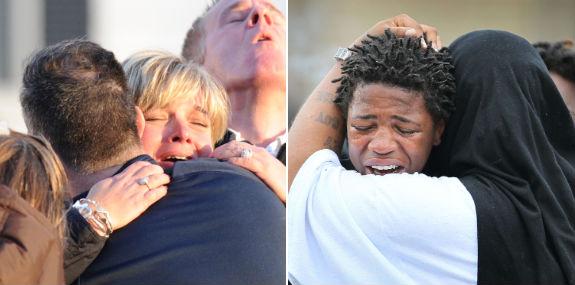Urban Lives Saved by Suburban Gun Mayhem
Share
Explore Our Galleries
Breaking News!
Today's news and culture by Black and other reporters in the Black and mainstream media.
Ways to Support ABHM?
By Keli Goff, theRoot.com
It’s a sad truth that our leaders only talk gun control when unspeakable tragedy hits close to home.
Shortly after the Jovan Belcher tragedy I was asked on a television program whether or not the NFL player’s high-profile murder-suicide and sports announcer Bob Costas’ courageous comments about gun violence in the incident’s aftermath would have any impact on gun control in America. I answered that they would not. The reason? Because as I noted during that interview, historically our country has only addressed the issue of gun violence when it touches the lives of those with whom our leaders are most likely to identify. Rarely are those likely to be incidents involving people of color suffering domestic violence or teens of color from low-income communities who are victims of urban gun violence.
Instead the gun tragedies that have actually moved our elected officials to significant action on gun control have been those incidents in which victims are most likely to remind our leaders of their own friends, families and communities, incidents like the 1993 shooting on a Long Island Rail Road train, which killed commuters from New York’s professional class or the 1999 Columbine High School shooting, which made gun control the cause célèbre of white suburban moms, culminating in the Million Mom March in 2000.
Now it appears another incident is poised to finally move our leaders to action once again, 13 years after Columbine. The murder of 20 children and six adults in the quiet and normally safe enclave of Newtown, Conn., on Dec. 14 is forcing a conversation about gun control that the shooting of 26 residents in one night in Chicago this summer — resulting in the deaths of two teens and injury of 24 others — could not. As previously noted in an analysis by the now-defunct the Daily, more Chicago residents, many of them urban youth, were killed by gun violence in the first half of 2012 than American soldiers were killed in Afghanistan during the same period.
Just think about those numbers for a moment.
Read the rest here.










Comments Are Welcome
Note: We moderate submissions in order to create a space for meaningful dialogue, a space where museum visitors – adults and youth –– can exchange informed, thoughtful, and relevant comments that add value to our exhibits.
Racial slurs, personal attacks, obscenity, profanity, and SHOUTING do not meet the above standard. Such comments are posted in the exhibit Hateful Speech. Commercial promotions, impersonations, and incoherent comments likewise fail to meet our goals, so will not be posted. Submissions longer than 120 words will be shortened.
See our full Comments Policy here.